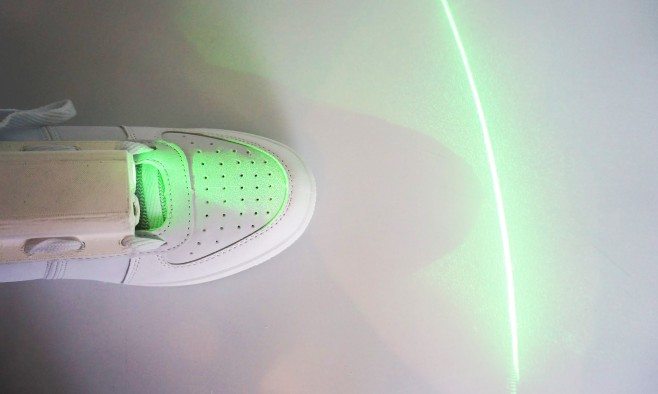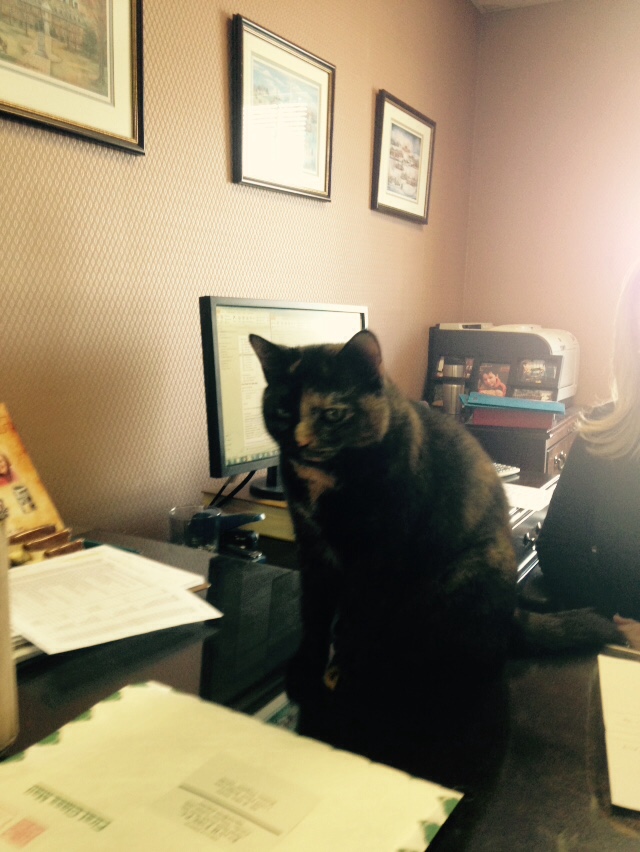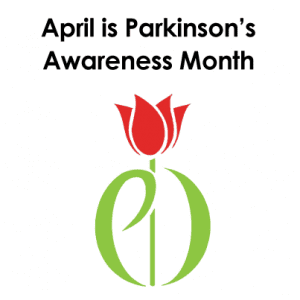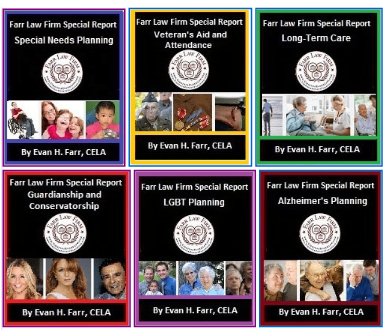Laser Shoes, Magic Carpets, & More: Technology to Combat Falls
Published: Fri, 04/29/16

Laser Shoes, Magic Carpets, & More: Technology to Combat FallsIf you cannot view the image below, please read the article on our blog. Path Finder Laser Shoes Q. My parents are snowbirds. Every spring, I pick them up at the Lorton Auto Train and drop them off at their home, and in
November, they go back to Florida for the winter. My father has had Parkinson’s for almost 20 years now, and the debilitating disease is taking its toll.
Yesterday, when I arrived at the station, I noticed that it was extra hard to move my dad from his wheelchair to the car and from the car back into his wheelchair. He used to be able to help me with the transition more using his arms and legs. Now, I find myself
having to lift my 170lb dad, and fear I will drop him or injure my back, or both. What I am most concerned about is what will happen when I am not around. I am wondering if you can recommend any fall prevention or fall detection products or technology that my parents can look into to assist my dad, and to ease my
mind across the miles.
A. For many older adults, falls and associated injuries threaten their health, independence, and quality of life. Sadly, unintentional falls are a leading cause of injury and death in older Americans, and the problem is getting worse. In fact, every 13 seconds an older adult is treated in
an emergency room for a fall. Every 20 minutes, an older adult dies from a fall-related trauma.
Most falls happen in the home, where simple aids and relatively inexpensive fixes can make a big difference, but many seniors are resistant to change. Currently, many mobile health innovators are focusing their attention on falls, and developing technology to predict, prevent, and detect them. Hopefully seniors will be more receptive to some of these exciting
innovations!
Below are some examples of fall detection and prevention technology:
Magic Carpet
Developed by researchers at GE and Intel at Intel’s Innovation Lab, the Magic Carpet prototype uses sensors in a home carpet to monitor the activity of seniors. For a week, the carpet observes and "learns" the older person's typical routine. After that, the system rigorously checks for sudden or even gradual
abnormalities in the elderly person's "baseline," and if there are any, it sends an alert to a family member or physician.
SorbaSHOCK™ flooring
SorbaSHOCK™ is a revolutionary new flooring product has been developed to help with injury prevention related to falls. SorbaSHOCK™ was specifically designed to cushion the body at acute points and potentially reduce injury, should a fall occur. According to the company’s website, the floor’s
“dual-stiffness” underlayment is appropriate for assisted living, skilled nursing, Alzheimer/dementia, hospital, and residential installations.
Path Feel Insoles
Pressure sensors in Path Feel insoles provide feedback that vibrates the wearer’s foot and informs them when it is touching the ground. A companion app also gathers data in the hope of better understanding peripheral neuropathy.
Path Finder Laser Shoes
Path Finder shoes are designed specifically for seniors who are more susceptible to falling and for Parkinson’s patients who suffer from freezing of gait—a disabling clinical phenomenon that prevents people from walking or causes them to walk with extremely short steps. Lasers
projected out of the shoes in a green line aim to provide visual clues to help the senior focus on putting one foot in front of the other.
Medical Guardian
The Medical Guardian is an affordable medical alert service that does not require long-term contracts or charge any service fees. It provides reliable coverage in your home and alerts emergency responders in the
event of a fall where you cannot access help.
Guardian Angel
Similar to the Medical Guardian, the Guardian Angel is an emergency alert device, but this one can be downloaded to your phone. Using the Guardian Angel, if your father falls and requires immediate help, he can push a button that alerts a list of predetermined contacts where he is and that he needs help. If he needs an emergency
response, those contacts can know exactly what the issue is and what kind of help is needed.
SafeinHome Wireless Sensors
SafeinHome is a mobile solution that provides oversight of seniors when they’re home alone. SafeinHome’s mobile device-enabled services use wireless sensors to track the elderly person’s activities while they’re home, their length of stay in a room, when they leave and return to the house, if they’ve left
the stove on or touched their medications, or if a fall occurs and your loved one isn’t moving. The system sends information directly to family members’ smartphones or tablets, and alerts them about unusual events that could mean there is a problem.
Take the right steps
In addition to the exciting technology described, if your father takes care of his overall health and your family makes modifications to the home, you may be able to lessen the chances of him falling. Here are a few tips to help him (or anyone) avoid falls and related injuries:
• Stay physically active: Seniors should do regular exercise as prescribed by a doctor or physical therapist to keep bones stronger and improve muscles. Exercise also helps keep your joints, tendons, and ligaments flexible. Get the free booklet, Exercise & Physical Activity: Your Everyday Guide from the National Institute on Aging.
• Have your eyes and hearing tested often: Small changes in sight and hearing can put you at risk for falling. When you get new eyeglasses, take time to get used to them. Always wear your glasses when you need them. If you have a hearing aid, be sure it fits well, and wear it.
• Find out about the side effects of any medicine you take. If a drug makes you sleepy or dizzy, you should talk to your doctor or pharmacist.
• Get enough sleep. If you are sleepy, you are more likely to fall.
• Stand up slowly after eating, lying down, or sitting. Getting up too quickly can cause your blood pressure to drop, and can make you feel faint.
• Use a cane, walking stick, or walker to help you feel steadier when you walk. This is very important when you’re walking in areas you don’t know well or in places where the walkways are uneven. And of course be extra careful when walking on wet or icy surfaces! Always have sand or salt spread on icy areas by your front or back door.
• Wear rubber-soled, low-heeled shoes that fully support your feet. Wearing only socks or shoes/slippers with smooth soles on stairs or floors without carpet can be unsafe.
• And, always tell your doctor if you have fallen since your last checkup — even if you aren’t hurt when you fall.
When technology and preventative measures aren’t enough, assisted living or nursing home care may be needed. Nursing homes in the DC Metro area can cost from $120,000/yr to more than $150,000/yr. The Medicaid Asset Protection Law Firm of Evan H. Farr, P.C. handles Life Care Planning and Medicaid Planning, which is the process of protecting you or your loved ones from having to go
broke to pay for nursing home care, while also helping ensure that you or your loved ones get the best possible care and maintain the highest possible quality of life, whether at home, in an assisted living facility, or in a nursing home. Please contact us to make an appointment for a no-cost initial consultation:
Fairfax Elder Law: 703-691-1888
Fredericksburg Elder Law: 540-479-1435 Rockville Elder Law: 301-519-8041 DC Elder Law: 202-587-2797 ----- Critter Corner: Home Modifications for Fall Prevention  Dear Angel, We just found out that my father will be moving in with us. He is in his 70’s, has Parkinson’s, arthritis, and is in a wheelchair a lot of the time. We don’t have much money to renovate, but we want to make sure our home is safe and comfortable for him. Also, if it is too much for us to handle alone, who can we call for assistance? Thanks, Reema D. Ling ---- Dear Reema, There are lots of simple modifications you can do to make your home safer for your father that don’t cost a lot or are completely free. By making some minor adjustments, your father can move into your home and hopefully live safely, comfortably, and independently, among his loved ones. The following are a few simple modifications from the AARP Home Fit Guide, that will help to decrease the likelihood of falls and to make your home all-around more accessible for your father: • Pick up any clutter that can cause your father to trip, such as newspapers, books, shoes, clothes, electrical cords, and phone cords. • If you have throw rugs, remove them or use double-sided tape or non-slip pads underneath to secure them. • If you have stairs, consider installing handrails on both sides. • Add lamps, light fixtures, and night lights where needed to improve visibility. Consider installing motion sensor lights outside the front and back doors and in the driveway. • Get some non-skid bath rugs for the bathroom floors, put a non-slip rubber mat or self-stick strips on the floor of the tub/shower and install grab bars inside the tub/shower. Consider getting a hand-held adjustable shower head installed and purchasing a shower or bathtub seat so your father can shower from a safe seated position. • Organize your kitchen cabinets so things are within easy reach. Make your cabinets and pantry easier to access by installing pullout shelves or turntables. • Since your father uses a wheelchair, adapt your home by installing ramps on entrance steps, and mini-ramps to go over high entrance thresholds. You can even widen the doorways an additional two inches by installing “swing clear” offset door hinges. • To make things more comfortable, since he has arthritis, replace round doorknobs with lever handles, round bathroom faucets with lever faucet handles, and knobs on cabinets with pull handles. If you are not handy or need professional guidance to make your home accessible for your father, please consider the following: • Think about hiring a Professional Organizer to help you organize and declutter, making rooms less crowded and therefore less of a fall hazard. You can find a directory of Certified Professional Organizers (CPO) by visiting the website http://www.certifiedprofessionalorganizers.org. • Find an Aging in Place Specialist to make your home accessible. You can find a directory of Certified Aging in Place Specialist (CAPS) by visiting the website of the certifying organization – the National Association of Home Builders, at http://www.nahb.org. Of course, if you live in the DC metro area, be sure to check out the Trusted Referrals listed on our website. Hope this helps! Angel ------ Sign up for our FREE Special Reports and get the answers to your burning questions! Just click on a cover
below!
|
 Upcoming Events  Our upcoming Living Trust Plus Seminar: "How to Protect Your Assets from the Expenses of Probate and Long Term Care" is on May 14 or June 18 in Fairfax. View the calendar of upcoming seminars and sign up here. ----------
|
||
|
This email was sent to
.
|









